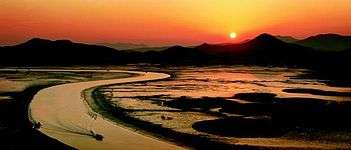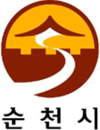Suncheon
| Suncheon 순천시 | ||
|---|---|---|
| Municipal City | ||
| Korean transcription(s) | ||
| • Hangul | 순천시 | |
| • Hanja | 順天市 | |
| • Revised Romanization | Suncheon-si | |
| • McCune–Reischauer | Sunch'ŏn-si | |
|
Photograph of Suncheon bay and reed fields in October, 2008. | ||
| ||
 Location in South Korea | ||
| Country |
| |
| Region | Honam | |
| Administrative divisions | 1 eup, 10 myeon, 12 dong | |
| Area | ||
| • Total | 907.21 km2 (350.28 sq mi) | |
| Population (2016) | ||
| • Total | 279,435 | |
| • Density | 298/km2 (770/sq mi) | |
| • Dialect | Jeolla | |
Suncheon (Korean pronunciation: [sun.tɕʰʌn]) (Suncheon-si) is a city in South Jeolla Province, South Korea. It is a scenic agricultural and industrial city of around 250,000 people near Suncheon Bay. It is located in the southeastern corner of Jeollanam-do, just over an hour south-east of Gwangju. Forty minutes south of Suncheon is the port city of Yeosu, and twenty minutes to the east of Suncheon is Gwangyang. It is currently experiencing strong development due to being included as part of the Gwangyang Bay Free Economic Zone, one of three newly created Free Economic Zones (FEZs) in South Korea due to open within the next decade. As of October 14, 2007 plans are being set up and a referendum is being planned for a merging of the cities of Yeosu, Suncheon and Gwangyang into a new metropolitan city, taking advantage of the Gwangyang Bay Free Economic Zone, Yeosu's Expo 2012 bid and port facilities, Suncheon's educational institutes and Gwangyang's POSCO plant.[1]
History
- Era of Samhan: Territory of Mahan
- Era of the three kingdoms: a territory of Baekje, named Gampyeong-gun
- Era of the unified Silla: named Seungpyeong-gun in 757, the 16th year of King Gyeongdeok's reign
- Era of Koryeo: renamed Seungju in 940, Taejo's 23rd year on the throne.
- Era of Koryeo: called Seungpyeong-gun in 1036, Seongjong's second year as king.
- Era of Koryeo: raised to the status of Seungju-mok in 1309, the year Chungseon becomes king.
- Taejong established the Suncheon Dohobu in the 13th year of reign, 1413.
- Changed to Suncheon-gun in 1895, under Gojong's reign.
- November 1, 1931: Suncheon-gun Suncheon-myeon becomes Suncheon-eup.
- August 15, 1949: 9 ri's of Dosa-myeon and part of Haeryong-myeon (Wangji, Jorye, and Yeonhyang) are annexed by Suncheon on August 13, 1949. The area is elevated to the City of Sunche on the 15th. Other surrounding areas are put into the district of Seungju-gun.
- January 1, 1995: reborn as 'Suncheon City' after annexing Seungju-gun.
Yeosu–Suncheon Rebellion
In October 1948, a rebellion swept Yeosu, Suncheon, and nearby towns, when South Korean soldiers refused to take part in the suppression of the ongoing Jeju uprising. The rebel forces killed a number of ROK soldiers, police, officials, and landlords. A couple days later, the rebellion was crushed by the South Korean military. Civilians thought to have aided the rebellion were also summarily executed.
Tourism
2013 Suncheon Garden Exposition
- 2013 Suncheon Garden Expo Korea: The 2013 Suncheon Garden Expo Korea was the first of its kind to be held in Korea. The Expo focused on green industry development such as solar energy, sustainable garden development and electronic transportation. It showcased green technologies, international garden exhibits, and wetland conservation. The Expo grounds, its permanent gardens, arboretum, wetland center, and connecting monorail to Suncheon Bay are maintained for continued tourism.
Temples
- Songgwang Temple: It is one of the Three Jewel Temples of Korea and a popular place for Jinul. The temple is located in Sinpyeong-ri, Songgwang-myeon. It is one of the Sambosachal along with Haein temple of Habcheon and Tongdo Temple of Yangsan. Jinul strived here to renew the tradition of Buddhism 800 years ago. The temple bore 16 state monks in the past. Today, the temple is home for monks from overseas and is a place to study the Buddhist culture of Korea. The temple was first built at the end of Silla Kingdom and named Gilsang Temple. It was then renamed in the Goryeo dynasty under the reign of Myeongjong, to Songgwang Temple. Reconstructions were done after it was burnt down in the Joseon dynasty, but was severely damaged again in 1948 and 1951. At present, 33 complexes have been restored after 8 reconstruction projects from 1984 to 1988. The temple has a total of 26 cultural assets, including 17 national cultural assets and 9 local ones.
- Seonamsa: Seonamsa of Mount Jogye is located in Jukak-ri, Seungju-eup, Suncheon. In the Baekje Kingdom, Adohwasang had first built a small temple in the mountain and named it Biroam of Cheongnyangsan Mountain. The temple was named Seonamsa later in the Silla Kingdom by state monk Doseon. Seonamsa is known to be a mixture of the various sects of Buddhism of the Goryeo dynasty. Cheontaejong was established here 900 years ago by Ui Cheon and the monk's heirs have been carried down to the present age. Seonamsa, like Songgwangsa, is a library for studies of Korean Buddhist culture. A total of 18 cultural assets are found here, including 7 treasures and 11 local cultural assets.
- Cheonjaam, Ssanghyangsu: Belongs to the Chinese juniper family, and is technically named Juniperus Chinensi Limme. The height is 12.5 m and the circumference is 3.98m. The tree is about 700 years old. According to the legend, the cane used by a Buddhist on his way back from China had grown into the tree. The tree is uniquely twisted form.
- Natural monument No, 88 (designated on Dec. 3, 1962).
- Ieub-ri, Songgwang-myeon (Songgwang Temple).
- Area 600 pyeong (1.98 km2).
Castles
- Nagan Castle, the only remaining Joseon castle in South Jeolla Province. It is well preserved and has many festivals like the Namdo food festival.
- Suncheon Japanese Castle, a Japanese castle built during the Japanese invasions of Korea.
Parks
- Suncheon Bay Ecological Park, the world's 5th biggest tideland, featuring reed beds and there many types of birds.
- Goindol Park, a dolmen park in Hwasun, Suncheon. Gochang, Hwasun and Ganghwa Dolmen Sites were designated as a World Heritage Site by UNESCO in 2000.
Parks
- Suncheonman,nature biodiversity bay.[2]
Slogans
On its website, Suncheon is dubbed by its city council as the City of Beautiful People, and its slogan is "Aha! Suncheon."[3]
Climate
| Climate data for Juam-myeon, Suncheon (1981–2010) | |||||||||||||
|---|---|---|---|---|---|---|---|---|---|---|---|---|---|
| Month | Jan | Feb | Mar | Apr | May | Jun | Jul | Aug | Sep | Oct | Nov | Dec | Year |
| Average high °C (°F) | 5.8 (42.4) |
8.4 (47.1) |
13.5 (56.3) |
20.1 (68.2) |
24.5 (76.1) |
27.6 (81.7) |
29.8 (85.6) |
30.8 (87.4) |
27.1 (80.8) |
22.1 (71.8) |
14.9 (58.8) |
8.5 (47.3) |
19.4 (66.9) |
| Daily mean °C (°F) | −0.4 (31.3) |
1.6 (34.9) |
6.2 (43.2) |
12.2 (54) |
17.1 (62.8) |
21.4 (70.5) |
24.9 (76.8) |
25.2 (77.4) |
20.5 (68.9) |
13.9 (57) |
7.3 (45.1) |
1.6 (34.9) |
12.6 (54.7) |
| Average low °C (°F) | −5.3 (22.5) |
−3.9 (25) |
0.0 (32) |
5.0 (41) |
10.7 (51.3) |
16.4 (61.5) |
21.2 (70.2) |
21.4 (70.5) |
16.1 (61) |
8.3 (46.9) |
1.8 (35.2) |
−3.5 (25.7) |
7.3 (45.1) |
| Average precipitation mm (inches) | 32.0 (1.26) |
45.9 (1.807) |
66.3 (2.61) |
92.2 (3.63) |
115.3 (4.539) |
211.1 (8.311) |
337.3 (13.28) |
326.9 (12.87) |
179.9 (7.083) |
50.9 (2.004) |
48.2 (1.898) |
25.5 (1.004) |
1,531.3 (60.287) |
| Average precipitation days (≥ 0.1 mm) | 8.0 | 7.9 | 9.0 | 8.7 | 9.2 | 10.3 | 15.1 | 14.0 | 9.1 | 5.9 | 7.7 | 7.8 | 112.7 |
| Average relative humidity (%) | 68.4 | 65.3 | 63.4 | 63.8 | 68.2 | 72.7 | 78.5 | 78.6 | 77.3 | 74.0 | 72.3 | 70.9 | 71.1 |
| Mean monthly sunshine hours | 149.2 | 154.5 | 182.9 | 200.4 | 205.4 | 158.8 | 137.7 | 156.8 | 148.7 | 170.9 | 140.5 | 139.0 | 1,944.9 |
| Source: Korea Meteorological Administration[4] | |||||||||||||
Twin towns/Sister cities
Suncheon is twinned with:
-
 Columbia, Missouri, United States
Columbia, Missouri, United States -
 Jinju, South Korea
Jinju, South Korea -
 Yangcheon District, South Korea
Yangcheon District, South Korea -
 Iksan, South Korea
Iksan, South Korea
The city also has friendship relations with:
See also
References
- ↑ http://english.chosun.com/w21data/html/news/200709/200709070009.html
- ↑ "Wonders of nature: Incredible Biodiversity at Suncheonman Bay!". visit korea. Retrieved 7 December 2014.
- ↑ http://www.suncheon.go.kr/home/english/index.jsp
- ↑ "평년값자료(1981–2010) 주암(256)". Korea Meteorological Administration. Retrieved 2011-05-04.
External links
| Wikimedia Commons has media related to Suncheon, Jeollanam-do. |
| Wikivoyage has a travel guide for Suncheon. |
Coordinates: 34°57′N 127°29′E / 34.950°N 127.483°E


